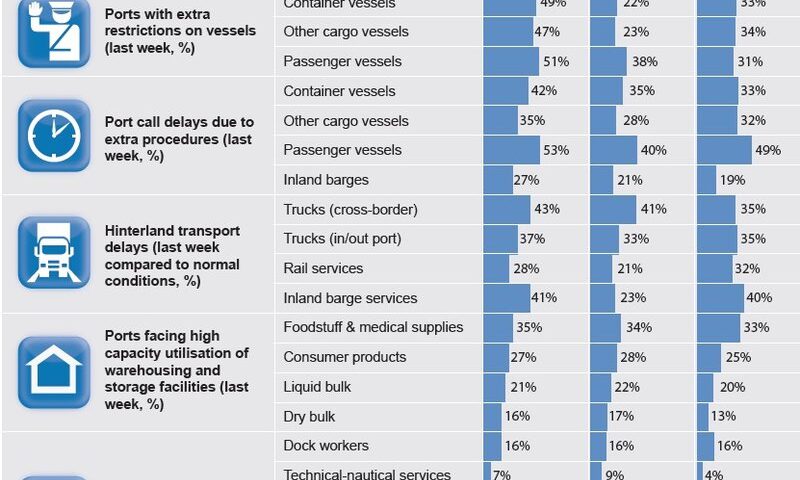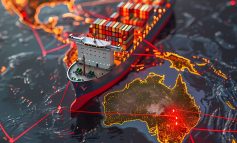In the third of a series of weekly WPSP-IAPH COVID19 port economic impact barometer report, the gradual impact of blank sailings by the world’s major container shipping alliances is beginning to be felt by ports. While the average weekly number of container vessels calling remains down with further cancellations, some lines have replaced these by regional feeders with good frequency.
Compiled by PortEconomics members Theo Notteboom and Thanos Pallis, the full report might be downloaded here.
A dashboard is making its debut in this week’s report – visualising the summary of world ports’ responses of the last three weeks.
Container ports
The situation for container vessel calls shows a clear deterioration compared to the previous two weeks. Only 41% of the respondents report a rather stable situation (vs.52% and 54% in weeks 15 and 16 respectively). An elevated 42% of the ports experience moderate declines (minus 5% to 25%) in container vessel calls. Already 1 out of every 10 ports faces significant decreases (in excess of a 25% drop), compared to less than 3% last week.
“We have begun to see a reduction in vessel calls with blank sailings on the main East-West trades” comments report co-author Theo Notteboom. “Nonetheless an interesting development we have observed from the responses is that some ocean carriers have replaced these cancellations by regional feeders with good frequency. As a result, the reduced number of long-haul calls has been counterbalanced. There are also some cases in which a slight increase in containerised vessels has been reported with public demand for specific goods on the rise during the lock-down period” he added.
The Task Force has also reported some of the larger container lines requesting quays to be used for cargo storage for those containers where shippers or forwarders have opted for suspension of transit (SOT), predominantly inbound cargo from Asia to Europe and the Americas. Reports of transhipment hubs, as well as main line ports having capacity available, has alleviated some destination ports in terms of congestion.
Storage capacity levels on the quayside and in warehousing facilities stabilise in some ports
For some ports, yard congestion is the result of laden imports of non-essential goods including new cars, which remain in port longer than usual. When rules exist to only handle essential goods, the utilization of storage capacity within the ports has become critical. Therefore respective governments have now allowed the weekly release and acceptance of import / export of non-essential goods on average of 3 days a week; a move that has brought down storage utilization at some container yards by 60%.
“While on one hand container and general cargo storage area utilisation has increased, the lockdown of major industries has led to serious underutilization of terminals and storage areas and warehousing for several other cargoes” comments co-author Thanos Pallis. “These include black and white breakbulk cargoes, steel, heavy lift cargo, and machinery. Liquid bulk is still suffering from a non-favourable downward trend in market demand. Nonetheless, in some cases, storage tanks for liquid bulk are already full or rented, so no more tank storage is available.”
WPSP-IAPH COVID19 Dashboard debut in Port Economic Impact Barometer Report
In order to provide a visual guide to the data accumulated so far from the world’s ports and to track the impact of COVID19, this third report also includes a dashboard summarising the main findings of the surveys so far. IAPH Managing Director Patrick Verhoeven explained: “In the coming weeks, we expect many ports will feel the full impact of the collapse of economic activity in many parts of the world. To help ports adapt to the new normal will not be easy. Having data on precisely what is going on is invaluable, which is why we call out to our members and all other ports to give us their input, even if the status from the previous week is the same.”












